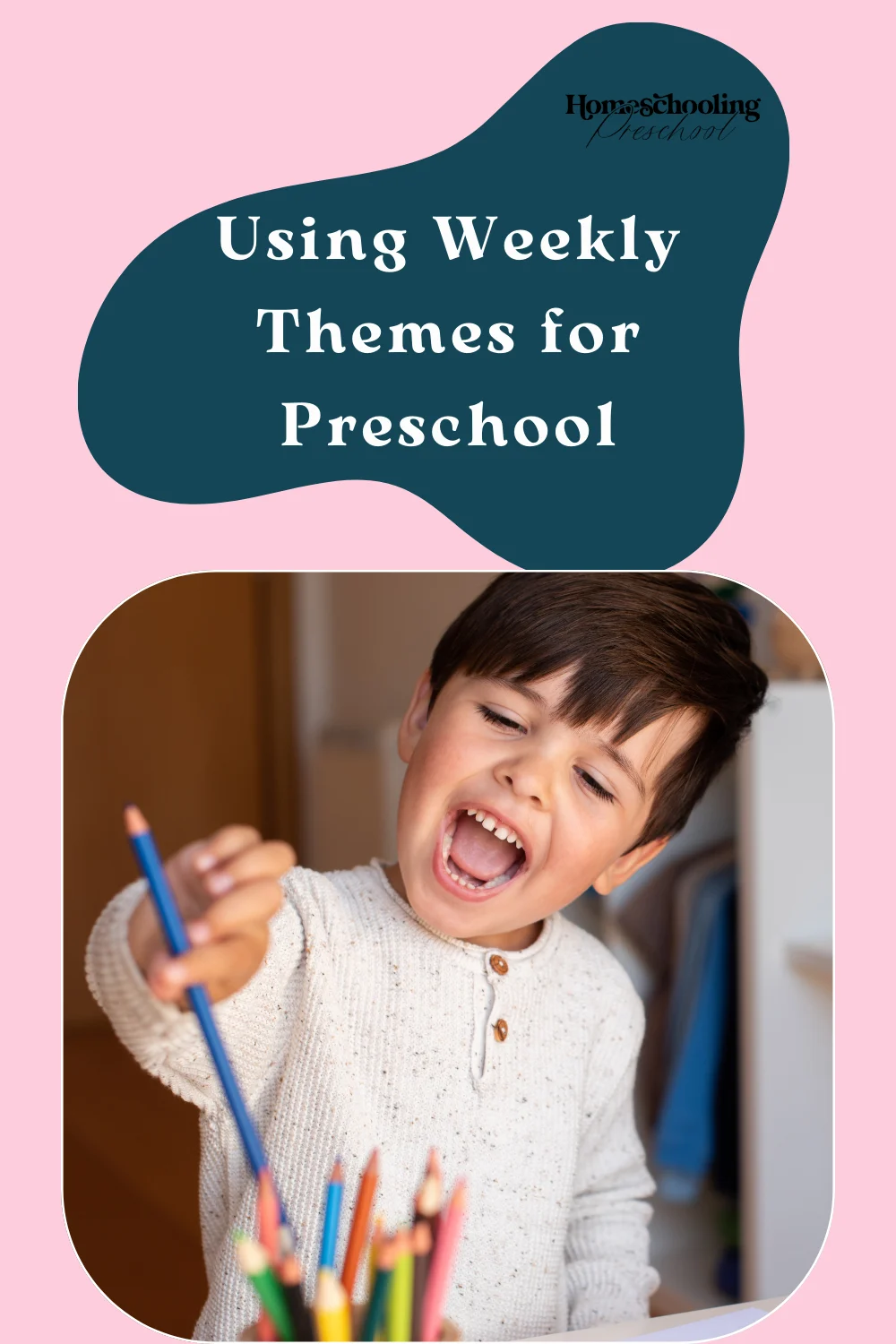Are you using weekly themes in your homeschool preschool? If not, here are some reasons why you might want to start!

As a homeschooling parent, I have found that incorporating themes into our weekly lessons has been incredibly beneficial for my preschooler’s development.
Not only does it make learning more engaging and interactive, but it also helps in fostering a well-rounded and comprehensive understanding of various topics.
Here are some reasons why I believe using themes is crucial for preschool homeschooling, along with some tips and tricks that have worked well for us.

This article may contain affiliate links to products that may help you when homeschooling preschool.
Benefits of Using Weekly Themes
Enhanced Learning Experience
Structuring our lessons around a central theme adds depth and meaning to the learning process.
It allows my child to explore a specific subject in a focused manner, which leads to better retention and comprehension.
For example, if our theme is “Animals,” we can cover various aspects such as animal habitats, life cycles, and characteristics and even incorporate free homeschool printables and arts and crafts related to animals.
Doing lapbook lessons, hands-on activities, and more gives us a chance to do a deep-dive into subjects.
Language Development
By using themes, we expose our preschoolers to a wide range of vocabulary related to the chosen topic.
This exposure helps in expanding their language skills and building a strong foundation for future literacy.
We often engage in storytelling, reading books, and singing songs that revolve around our weekly theme.
Even if you don’t have the best singing voice, your kids don’t care! They just want to sing with mom or dad!

Cognitive Growth
Themes promote critical thinking and problem-solving skills.
When we explore a theme, we encourage our child to ask questions, make observations, and draw connections between different concepts.
This process not only stimulates their curiosity but also fosters cognitive growth and the development of logical reasoning skills.
These are so important for their development!
Social and Emotional Development
Themes provide opportunities for social interaction and collaboration.
We often engage in themed playdates or organize virtual meetings with other homeschooling families who are studying the same topic.
This allows my child to share ideas, work in teams, and develop important social skills such as communication and cooperation.
Even at the preschool age, or should I say, especially at the preschool age, these skills are vital!

Fine and Gross Motor Skills
Many themes lend themselves well to activities that promote the development of fine and gross motor skills.
For instance, if our theme is “Transportation,” we might engage in activities like building a car out of recycled materials or practicing balance and coordination through an obstacle course inspired by different modes of transportation.
Playdough mats and dramatic play are also really easy to work into learning when you’re using weekly preschool themes!

Tips and Tricks for Incorporating Weekly Preschool Themes
Here are some tips and tricks that have worked well for us when incorporating themes into our homeschooling routine.
Interests
Start by choosing a theme that aligns with your child’s interests or current learning goals.
This will ensure they remain engaged throughout the week.
There’s absolutely nothing worse than trying to do a weekly theme that no one is interested in!
Plan Ahead
Plan ahead and gather resources related to the theme, such as books, puzzles, toys, and art supplies.
I like to look ahead and gather everything for all of the themes each month during the last week of the month prior.
It can be work, but, boy, does it make it easier during the week of that theme!

Create a Weekly Theme Schedule
Create a weekly schedule that outlines specific activities and lessons for each day based on the theme.
This is really a lot easier than it may sound.
For example, you may plan to do science activities related to the theme every Tuesday and Art Projects every Thursday.
When you can consistently plug in the type of activity for the theme each week, it makes planning the schedule so much easier!
Get Out
Incorporate hands-on activities, field trips (if possible), and sensory experiences to make learning more interactive and memorable.
If your preschool weekly theme is leaves for example, take a walk around the block and gather leaves or take pictures of trees.
Being outside, even if it’s not on a fancy field trip, can really make learning more fun.

Open-Ended Play
Encourage open-ended play and exploration within the theme to spark creativity and imagination.
This is where things like dramatic play come into, well, play!
Document
Document your child’s progress and celebrate their achievements throughout the week.
Not only will this give you something to look back on at the end of the school year, but, if you have to keep a homeschool portfolio, it’s great proof that your kids have been learning and engaged.

Preschool Weekly Themes for Each Month
Here are some themes for each month of the year:
- January Preschool Themes (coming soon)
- February Preschool Themes (coming soon)
- March Preschool Themes (coming soon)
- April Preschool Themes (coming soon)
- May Preschool Themes (coming soon)
- June Preschool Themes (coming soon)
- July Preschool Themes (coming soon)
- August Preschool Themes
- September Preschool Themes
- October Preschool Themes
- November Preschool Themes
- December Preschool Themes (coming soon)

Weekly Themes in Preschool
By implementing themed lessons in our homeschooling routine, we have witnessed remarkable progress in our preschooler’s overall development.
The combination of engaging content, interactive activities, and focused learning has made our homeschooling journey both enjoyable and effective.
And, let’s face it, a lot more fun for the kids and mom!
